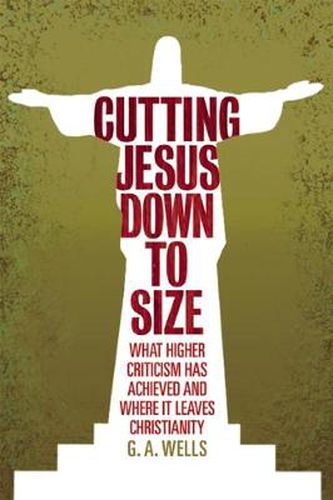Readings Newsletter
Become a Readings Member to make your shopping experience even easier.
Sign in or sign up for free!
You’re not far away from qualifying for FREE standard shipping within Australia
You’ve qualified for FREE standard shipping within Australia
The cart is loading…






In this provocative book, noted scholar G. A. Wells tells the story of Higher Criticism: the close study of the scriptures that reveals difficulties and discrepancies. Wells traces the discipline’s German beginnings, exploring the problems in the New Testament that prompted scholars to revise traditional theories of the scriptures’ origins. Wells then traces the development and reception of these views from the 18th century to today. Drawing on current biblical scholarship, Wells explains how the Jesus of Paul’s epistles differs radically from later versions and addresses conservative Christians’ attempts to reconcile them. He carefully analyzes what the New Testament says about miracles, the Virgin Birth, the Nativity, Jesus’ conflicting genealogies, the Resurrection, the post-Resurrection appearances, and the failed prophecies of imminent apocalypse. Wells persuasively profiles the New Testament as a fascinating but flawed collection of incompatible viewpoints, revealing Jesus as a shifting, ambiguous, legendary figure who reflected the evolving teachings of a fragmented, emotion-based cultic movement.
$9.00 standard shipping within Australia
FREE standard shipping within Australia for orders over $100.00
Express & International shipping calculated at checkout
In this provocative book, noted scholar G. A. Wells tells the story of Higher Criticism: the close study of the scriptures that reveals difficulties and discrepancies. Wells traces the discipline’s German beginnings, exploring the problems in the New Testament that prompted scholars to revise traditional theories of the scriptures’ origins. Wells then traces the development and reception of these views from the 18th century to today. Drawing on current biblical scholarship, Wells explains how the Jesus of Paul’s epistles differs radically from later versions and addresses conservative Christians’ attempts to reconcile them. He carefully analyzes what the New Testament says about miracles, the Virgin Birth, the Nativity, Jesus’ conflicting genealogies, the Resurrection, the post-Resurrection appearances, and the failed prophecies of imminent apocalypse. Wells persuasively profiles the New Testament as a fascinating but flawed collection of incompatible viewpoints, revealing Jesus as a shifting, ambiguous, legendary figure who reflected the evolving teachings of a fragmented, emotion-based cultic movement.